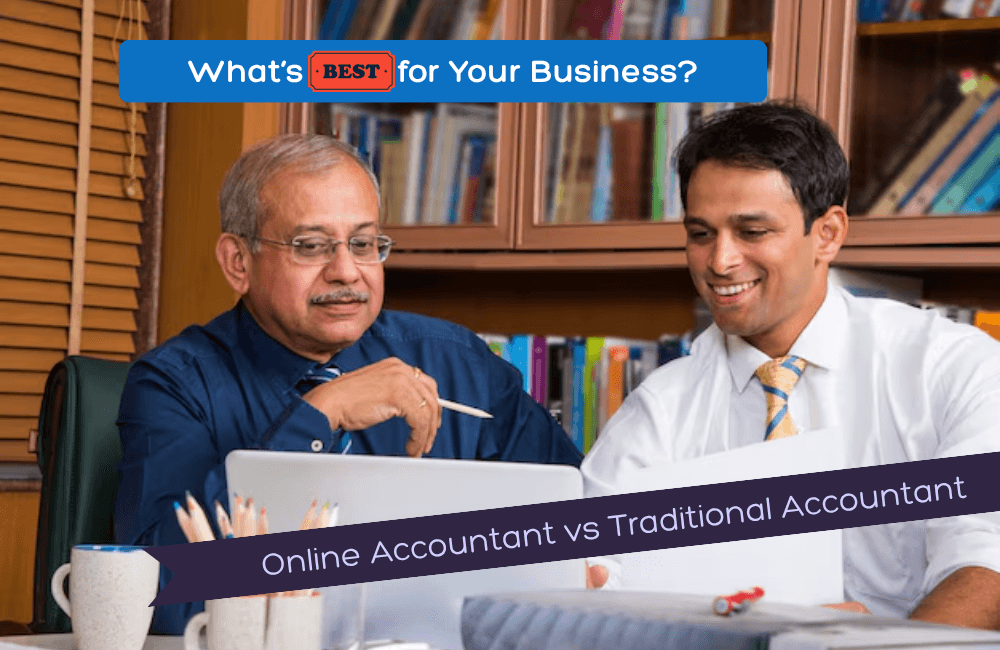
Rashid Hassan
Online Accountant vs Traditional Accountant: What’s Best for Your Business?
Choosing the right accountant can make or break your financial peace of mind. For UK business owners, the decision between hiring an online accountant or going the traditional route isn’t always clear. Both offer value but which one suits your situation?

we’ll walk through both options, outline their pros and cons, and help you decide which approach works best whether you're managing a limited company, running a side hustle, or just need help with your annual tax return.
What Is an Online Accountant?
An online accountant is a qualified professional offering financial services digitally. Instead of scheduling in-person meetings or handling piles of paper, everything is managed online from bookkeeping to tax filing.Online accounting services use cloud-based platforms that allow you to track your finances in real-time. You can upload receipts, view income, and monitor expenses wherever you are, whenever you need.
Why Businesses Are Turning to Online Accounting
Over the past few years, the demand for online accountant UK services has grown. Here's why:
1. Flexibility & Convenience
You’re not limited by location or business hours. Your accountant is just an email or video call away, and you can access your data 24/7.
2. Paperless Efficiency
Forget printing, scanning, and mailing. Everything from your invoices to your tax records lives safely in the cloud.
3. Affordable Packages
Most online accounting services offer fixed monthly plans, which makes budgeting easier. These often include payroll, VAT, and self-assessments, helping you stay compliant without surprises.
4. Support with Tax Returns
Whether you're self-employed or managing a limited company, having a reliable tax return accountant ensures your HMRC submissions are accurate and stress-free.
Traditional Accountant: The Classic Approach
While online accountants offer speed and tech tools, traditional accountants provide face-to-face guidance. This hands-on approach can be beneficial if:
-
Your finances are particularly complex
-
You prefer in-person meetings
-
You need detailed advice for large-scale tax planning
Traditional accountants typically work from an office and charge based on time spent or per service provided.
Online vs Traditional: A Quick Comparison
|
Feature |
Online Accountant |
Traditional Accountant |
|
Communication |
Email, chat, video calls |
In-person or phone |
|
Availability |
24/7 access via cloud platforms |
Limited to office hours |
|
Cost |
Fixed packages (often lower overall) |
Variable, may include hourly charges |
|
Paperwork |
Digital and automated |
Manual, sometimes paper-based |
|
Ideal For |
SMEs, freelancers, startups |
Large firms, complex business models |
Limited Companies: Can They Go Fully Digital?
Absolutely. A growing number of limited companies in the UK are now supported by online accountants for limited company needs. Services typically include:
-
Year-end accounts
-
Corporation tax filing
-
VAT returns
-
Director self-assessments
-
Real-time profit and loss tracking
Whether you're just starting or already established, digital accounting can help streamline your business operations.
The Role of Tax Accountants in a Digital World
While many people associate tax accountants UK with traditional offices, things are evolving. Many now offer hybrid solutions digital services combined with occasional in-person meetings. This gives you the best of both worlds: modern convenience and personal support.
Real-World Example
Take, for example, a growing UK-based digital agency. They wanted affordable yet reliable support for monthly bookkeeping, VAT submissions, and self-assessment filing. Instead of hiring a traditional firm, they opted for a digital service provider like Affotax gaining access to expert advice, lower costs, and real-time data visibility.This switch helped them reduce accounting errors, meet deadlines consistently, and stay focused on growth.
Conclusion
Both traditional and online accountants offer valuable services but your choice depends on your business model, complexity of finances, and preferred communication style. If you’re looking for flexible, transparent, and modern solutions, an online accountant may be your ideal match. From managing books to submitting tax returns, the benefits of going digital are clear: convenience, lower costs, and real-time insights. However, if you need face-to-face strategy sessions or high-level corporate planning, a traditional accountant may still be worth considering. Whichever path you choose, make sure it aligns with your business needs, budget, and long-term goals. And if you ever need help navigating online accounting in the UK, reliable firms like Affotax are ready to support your journey with tailored expertise.
FAQs
Q1: Is switching to an online accountant easy?
Yes. Most online services guide you through the transfer process, including notifying HMRC and importing your existing data.
Q2: Are online accountants regulated?
Definitely. Reputable online accountants in the UK are members of recognised bodies like ACCA, ICAEW, or AAT.
Q3: Can they handle VAT and payroll?
Yes. Most online accountants offer VAT services, payroll processing, and even pension contributions.
Q4: What if I need help urgently?
Most online firms offer live chat, phone support, or email responses often quicker than traditional appointments.
Q5: Is my financial data secure online?
Top-tier providers use encrypted systems and comply with GDPR, ensuring your data is safe and private.